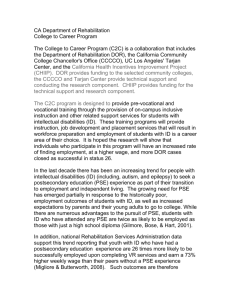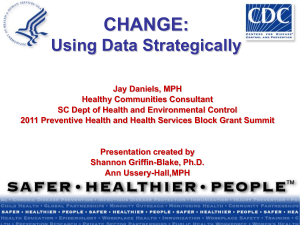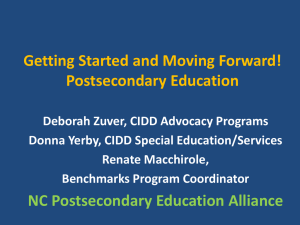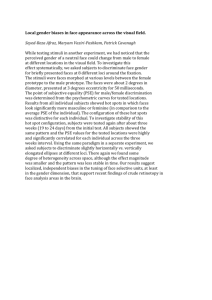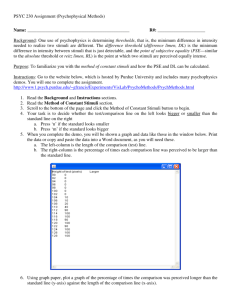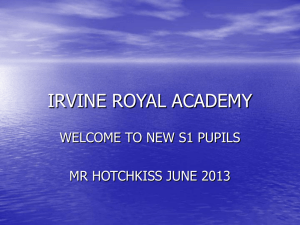Postsecondary Education
advertisement
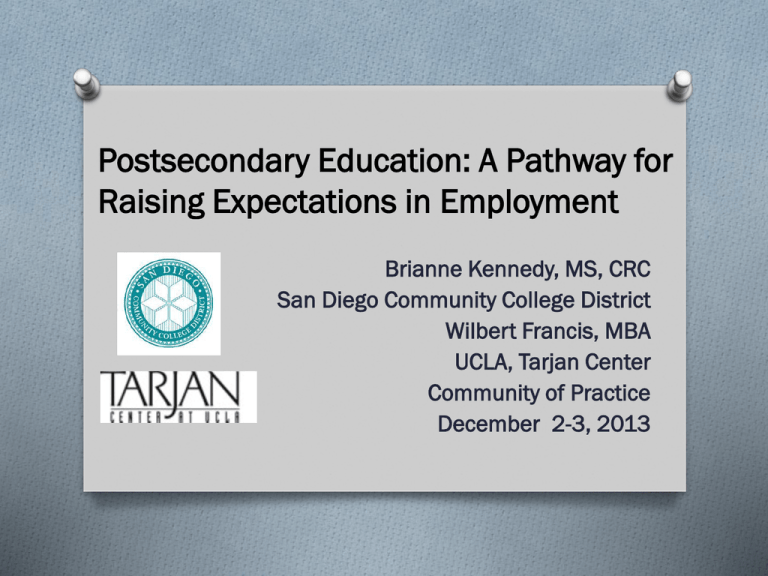
Postsecondary Education: A Pathway for Raising Expectations in Employment Brianne Kennedy, MS, CRC San Diego Community College District Wilbert Francis, MBA UCLA, Tarjan Center Community of Practice December 2-3, 2013 Purpose of the Presentation Three primary objectives of this workshop: O Professionals will expand their consideration of PSE to individuals whom they might not have considered before. O Participants will learn about non-traditional ways PSE can be utilized as a pathway to employment for individuals with intellectual disabilities. O To provide a tangible road map for professionals to utilize to facilitate the transition to PSE. 2 Far Too Few Youth are Employed in California 75,450 working age individuals with DD served by regional centers 70% are in day programs 14% in work activity programs 8% in group supported employment 6% in individual employment (2011-2012 DDS Annual Report & StateData) Why Postsecondary Education? O Students with intellectual disabilities who had some type of PSE experience were much more likely to: o obtain competitive employment o require fewer supports o earn higher wages o have increased self-esteem o Have expanded social networks that included students without disabilities O With even less than four years of PSE, PWD are employed at double the rate of those with just a high school diploma. Why Postsecondary Education? O Families and individuals are concerned about: o social networks after transitions o adequate support for job success o coordination with adult service providers o living arrangements and o available post-school options O National VR database (RSA 911): Youth with ID were 26% more likely to leave VR with a paid job and earn a 73% higher weekly income O Youth not willing to be relegated to day programs or segregated employment Landscape of Postsecondary Education OThousands of youth enrolled in PSE OLegal/Public Policy (HEOA of 2008) OFunding o Federal TPSID o 27 Nationally and 3 in California OExisting PSE models in transition and higher education o K12 o 2 & 4 year colleges TPSID Programs 7 College Programs for Youth with Intellectual Disabilities and Autism What is College to Career (C2C)? O College to Career (C2C) programs are postsecondary programs for individuals with intellectual disabilities (ID) O Provide instruction, campus supports, job development and placement services for students with ID (categorized as DDL) O Department of Rehabilitation (DOR) funded initiative developed in FY 2010-2011 in collaboration with the California Community Colleges' Chancellor's Office 9 Unique Features of College to Career Funding DOR funded 5 California Community Colleges (pilot sites) for four years College Locations Santa Rosa Jr. College, Sacramento City College, College of Alameda, North Orange County Community College District and San Diego Community College District Students Regional Center Consumers and DOR Clients Goal of C2C Employment of students with ID in a career area of their choice 10 DOR Contract: Purpose OGoal of C2C O Employment – REAL JOBS FOR REAL WAGES in a career area of student choice O Successful case closure into employment O Students attend local college and avail themselves of a quality inclusive higher education focused on employment DOR, California Community College Chancellor’s Office and Tarjan Center Collaboration O DOR administers the contract and provides additional services as determined by the Individual Plan for Employment (IPE) O Tarjan Center UCEDD: Coordinating role for Training, TA and Program Evaluation O CCCCO: Funds Tarjan Center, supports colleges implementation of programs The goal of the grant is to build the capacity of CA state systems and local communities to increase the number of individuals with intellectual disabilities (ID) and other developmental disabilities (DD) in integrated competitive employment. Mission of CECY The mission of CECY is to increase the number of youth and young adults with developmental disabilities who are getting good jobs and earning money by working in careers of their choice. CECY Community Conversations Community Conversations aim to build awareness, tap into existing opportunities, as well as cultivate new allies and partners. OThis is an opportunity to develop new ‘allies’…members from the community who typically are not asked to engage in a conversation about our youth. OIt’s strictly focused on existing untapped opportunities OIt’s a strengths oriented discussion OIt’s drawing out from the discussion, “what is possible now!” What is the focus of CECY’s Community Conversations? Focal Question: How can we increase the employment of youth with disabilities in our communities? What are the existing assets in our community? What do we know that is working for youth with intellectual and other developmental disabilities? What role can my organization play? What can I do? Who do I know that should be part of this effort? Career Technical Education Linkages O California Department of Education's $250 million Career Pathway Investment Trust Fund O AB 86 O Adult Education Planning Grants O SB 1070 O Career Technical Education Pathways Program Grant What Does the College Environment Have to Offer? O Increased expectations O Exposure to a diverse and inclusive student population O Professional communication o Instructors, Peers, Counselors O Self-advocacy o Request and utilize accommodations O Increased responsibility O Social networks o Campus activities and clubs O Vocational training courses O Campus work experience and job sampling O Independent navigation Transferrable Elements to Inclusive Work Settings O Student learn to: O Utilize natural supports O Work effectively in groups O Soft skills needed in the workplace O Communicate with supervisors and co-workers O Increased confidence and self-worth O Improve time management and organization O Industry specific knowledge and skills Hello I am Miss Amanda Terrones Job of a Child Care Worker O Organize and lead O Read Educational and fun books to the children O Serve meals and snacks in accordance with nutritional guidelines o Play games o Attend to their basic needs O Provide a variety of materials and resources for children to explore O Keep Children Safe My classes at Miramar College O Child Development 180- Health and Safety o 3 Units o My grade was a B O Child Development 141- Child, Family & Community o 3 units o My grade was a C O Child Development 111- Music and Movement o 3 units o I am hoping to get an A, B or C O I have also taken Aquatic Fitness, Tennis, Keyboarding, Accessible Computer lab and C2C Classes What I have learned O I have learned how to make lesson plans. O I have learned how to lead a circle time O I have learned about health and safety O I have also got my CPR card O I have actually led circle time and a lesson plan at Walker Elementary preschool O I have learned lots of fun songs to sing with preschool children CPR My Internship O Walker Elementary School O I work in the pre-K class with 3-5 year olds O I do arts and crafts with the kids O I also help Ms. Roma Weaver with circle time O I volunteer 3 days per week O Ms. Weaver likes my help so much that she said after I am done with my certificate she will help me and the C2C staff find a paid job for me! College 2 Career Snapshots Introduce Critical College Success Skills Early O Student Planners o Schedule appointment o Homework assignments O Travel Training o Community safety O Computer Skills o Professional email o Microsoft Word o Flash drive O Self-Advocacy o Active participation in IEP planning O Money Management O Completing Applications Considerations for PSE Transition Planning O Start the planning early! O Don’t eliminate PSE as an option based solely on O O O O student’s academic aptitude Learn about local college’s supports and services for students with disabilities Identify student’s strengths, skills, learning style, interests and environmental demands Think and search outside the box for PSE supports that will work for your student Make sure it is the student who wants to experience PSE Transition to PSE Road Map O Preparing students and parents for the O O O O differences between high school and college How to reinforce critical college success skills at home and in secondary settings Step by step process of getting connected to college Seamless transition timeline Additional web links and resources Questions??? Remember, PSE is an option for all… including individuals with intellectual disabilities! Thank you!
